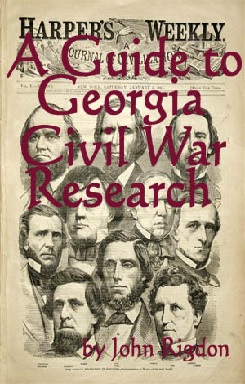Charles Henry Smith "Bill Arp"

In the late nineteenth century Bill Arp's weekly column in the Atlanta Constitution, "The Country Philosopher," syndicated to hundreds of newspapers, made him the South's most popular writer. In numbers of regular readers, no one exceeded Bill Arp. Bill Arp was born Charles Henry Smith in Lawrenceville on June 15, 1826. He married Mary Octavia Hutchins, the daughter of a wealthy lawyer and plantation owner, and started a family that would eventually include ten surviving children. Smith studied law with his father-in-law and then moved to Rome in 1851.
Smith made his home at Oak Hill, northwest of Kingston. When war came Smith joined the GA 8th Infantry Regiment and served as Commissary with the rank of Major of that regiment. This was the same regiment which Francis Bartow commanded before his death at 1st Manassas.
Smith wrote his first piece as the Rome Light Guards were assembling and preparing to depart for Virginia following the surrender of Ft. Sumter in April, 1861. This and later Civil War pieces utilized the Cracker dialect mixed with humor. This letter was a satire addressed to President Lincoln titled Mr. Lincoln, Sir responding to the President’s pleas to Southerners they should just stand down and go home following the events at Ft. Sumter. Smith wrote, “I tried my damd’st yesterday to disperse and retire, but it was a no go.”
Smith read the piece aloud to a crowd who had assembled. When he finished he asked them how he should sign the response to Lincoln. A man in the crowd–an everyday simple man- told Smith he agreed completely with everything he had written. He directed Charles Henry Smith, “Sign my name!”
In his book, "The Uncivil War to Date", Smith gave his own account of how he came to use "Bill Arp's" name.
Some time in the spring of 1861, when our Southern boys were hunting for a fight, and felt like they could whip all creation, Mr. Lincoln issued a proclamation ordering us all to disperse and retire within thirty days, and to quit cavorting around in a hostile and belligerent manner.
I remember writing an answer to it as though I was a good Union man and law-abiding citizen, and was willing to disperse, if I could; but it was almost impossible, for the boys were mighty hot, and the way we made up our military companies was to send a man down the lines with a bucket of water and sprinkle the boys, as he came to 'em, and if a feller sizzed like hot iron in a slack trough, we took him, and if he didn't sizz, we didn't take him; but still, nevertheless, notwithstanding, and so forth, if we could possibly disperse in thirty days we would do so, but I thought he had better give us a little more time, for I had been out in an old field by myself and tried to disperse myself and couldn't do it.
I thought the letter was right smart, and decently sarcastic, and so I read it to Dr. Miller and Judge Underwood, and they seemed to think it was right smart, too. About that time I looked around and saw Bill Arp standing at the door with his mouth open and a merry glisten in his eye. As he came forward, says he to me: "Squire, are you gwine to print that?" "I reckon I will Bill," said I. "What name are ye gwine to put to it?" said he. "I don't know yet," said I; "haven't thought about a name." Then he brightened up and said: "Well, 'Squire, I wish you would put mine, for them's my sentiments;" and I promised him that I would.
So I did not rob Bill Arp of his good name, but took it on request, and now, at this late day, when the moss has covered his grave, I will record some pleasant memories of a man whose notoriety was not extensive, but who filled up a gap that was open, and who brightened up the flight of many an hour in the good old times, say from forty to fifty years ago.
Smith's home was ransacked and gutted by Sherman's men, but survived the war. His family fled to Alabama to escape Sherman's plunder.
After the war, "Bill" wrote:
But I'm a good Union man, so-called. I ain't agwine to fight no more, I shan't vote for the next war. I ain't no gurilla. I've done tuk the oath, and I'm gwine to keep it, but as for my being subjugated, and humilyated, and amalgamated, and enervated, as Mr. Chase says, it ain't so--nary time. I ain't ashamed of nuthin neither--ain't repentin--ain't axin for no one-horse, short-winded pardon. Nobody needn't be playin priest around me. I ain't got no twenty thousand dollars. Wish I had; I'd give it to those poor widders and orfins. I'd fatten my own numerous and interestin offspring in about two minits and a half. They shouldn't eat roots and drink branch-water no longer. Poor, unfortunate things! to cum into this subloonary world at sich a time. There's four of five of 'em that never saw a sirkis nor a monkey-show--never had a pocket-knife, nor a piece of cheese, nor a resin.
Right after the war Smith published some of this wartime writings in a book titled Bill Arp, So Called: A Side Show of the Southern Side of the War. “The Metropolitan Record, a Democratic newspaper in New York, quickly sold a thousand copies of this book. As a second printing was being readied, a mob broke up the editor’s office.” Charles Henry Smith also wrote a history textbook under the name Bill Arp titled, A School History of Georgia as a Colony and a State, 1733-1893 that was used in Georgia schools, From the Uncivil War to Date: 1826-1903 covers the reconstruction period.
In 1877 Smith and his family moved to a farm just east of Kingston. A year later the Atlanta Constitution printed a new letter from Bill Arp, his first in half a dozen years and the beginning of a twenty-five-year series of weekly columns called "The Country Philosopher." The letter, on the joys of farming, was in many ways different from the Bill Arp of the war and Reconstruction. Gone was most of the dialect (it would never completely disappear), but more important, the subject matter had changed: Arp now wrote delightful epistles of the pleasures of rural life, the comfort of home and family, the independence and strength of Georgia's common folk, and the bright memories of the days of his youth. Arp still wrote occasionally on political, economic, and social issues, including a number of pro-lynching columns in the 1890s, but it was his "homely philosophy," as it was called—his writings on the farm and fireside, the past, and various pastoral topics—that made him so popular.
Smith died on August 24, 1903. Evangelist Sam Jones performed his funeral ceremony. He stated: "Today we lay to rest Charles Henry Smith, but 'Bill Arp' we will always have with us." Smith is buried in Oak Hill Cemetery in Cartersville.

But I'm a good Union man, so-called. I ain't agwine to fight no more, I shan't vote for the next war. I ain't no gurilla. I've done tuk the oath, and I'm gwine to keep it, but as for my being subjugated, and humilyated, and amalgamated, and enervated, as Mr. Chase says, it ain't so--nary time. I ain't ashamed of nuthin neither--ain't repentin--ain't axin for no one-horse, short-winded pardon. Nobody needn't be playin priest around me. I ain't got no twenty thousand dollars. Wish I had; I'd give it to those poor widders and orfins. I'd fatten my own numerous and interestin offspring in about two minits and a half. They shouldn't eat roots and drink branch-water no longer. Poor, unfortunate things! to cum into this subloonary world at sich a time. There's four of five of 'em that never saw a sirkis nor a monkey-show--never had a pocket-knife, nor a piece of cheese, nor a resin.
Right after the war Smith published some of this wartime writings in a book titled Bill Arp, So Called: A Side Show of the Southern Side of the War. “The Metropolitan Record, a Democratic newspaper in New York, quickly sold a thousand copies of this book. As a second printing was being readied, a mob broke up the editor’s office.” Charles Henry Smith also wrote a history textbook under the name Bill Arp titled, A School History of Georgia as a Colony and a State, 1733-1893 that was used in Georgia schools, From the Uncivil War to Date: 1826-1903 covers the reconstruction period.
In 1877 Smith and his family moved to a farm just east of Kingston. A year later the Atlanta Constitution printed a new letter from Bill Arp, his first in half a dozen years and the beginning of a twenty-five-year series of weekly columns called "The Country Philosopher." The letter, on the joys of farming, was in many ways different from the Bill Arp of the war and Reconstruction. Gone was most of the dialect (it would never completely disappear), but more important, the subject matter had changed: Arp now wrote delightful epistles of the pleasures of rural life, the comfort of home and family, the independence and strength of Georgia's common folk, and the bright memories of the days of his youth. Arp still wrote occasionally on political, economic, and social issues, including a number of pro-lynching columns in the 1890s, but it was his "homely philosophy," as it was called—his writings on the farm and fireside, the past, and various pastoral topics—that made him so popular.
Smith died on August 24, 1903. Evangelist Sam Jones performed his funeral ceremony. He stated: "Today we lay to rest Charles Henry Smith, but 'Bill Arp' we will always have with us." Smith is buried in Oak Hill Cemetery in Cartersville.




